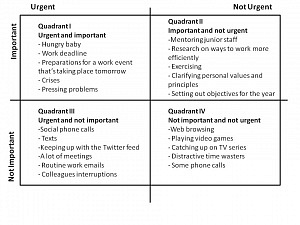Simple Tips That Make You More Productive
The other day, I attended a training forum where the speaker said something that stuck with me. He said that a good majority of us (more than 90%) will die having taken more out of this earth than we will have added. This is something that requires deeper thought in the context of our relationships, our ecosystems and the way we work, but today I will focus on the way we work and what we produce at the workplace.
In today’s world, it is easy to become a consumer. There is so much on offer. So many books to read, so many articles to read, so much stuff to buy and consume, so many places to go. At the work place, there is always something to review, reply to, meetings to attend etc. All these take the time we should be spending producing or adding to the world.
Stephen Covey in 7 Habits of Highly Effective People introduces the concept of the 4 productivity quadrants as shown below (click to enlarge):
As you can see in the example of tasks given, we naturally spend a lot of our productive time on quadrants I, III and IV for several reasons.
1. Quadrant I activities need to be done: Something will break if you don’t work on these. If the baby is hungry, she has to be fed otherwise her crying will drive you crazy and it is inhumane not to feed a hungry baby :). If you have a work deadline, you have little choice but to meet the deadline. Activities whose timeline is determined by external factors have to get done so we do them.
2. Many Quadrant III activities nag us. These are the things we want to get out of the way as fast as possible. When a colleague sends you an email with an “urgent” request, you subconsciously want to get that out of the way. If you have a heap of unsigned documents on your desk staring at you, you instinctively want to quickly sign them and get them out of the way. Or that quick meeting, or as it is called in Kenya, “small meeting”. It will take just 5 minutes, so why not get it out of the way. The reality is, these nagging tasks can end up becoming our work life. When you do 15 nagging tasks, you end up feeling like you have had a productive day while you really have not produced anything. I included Twitter there, though it can also become a Quadrant IV activity if uncontrolled.
3. Quadrant IV activities are pleasant and are a quick escape from productivity. Productive work is not always pleasant, and it involves deep thought, which most of us dislike. Quadrant IV activities relieve us of that need to think too hard. It is easier to read articles on the web, than it is to write a blog post. For avid Twitterers like me, Twitter is always a wonderful escape when work gets hard. Catching up with Game of Thrones feels like a must do, but it really is not. The problem with Quadrant IV is that it is worse than Quadrant III. While Quadrant III activities may result to slightly higher than zero productivity, Quadrant IV activities result to zero to negative productivity, and they are often as exhausting as being productive. I have realized that when I spend the day watching TV, I feel as tired as a day spent at work. Did you stay up last night reading random stuff on the web which caused you to wake up late today? Well, that’s how distracting Quadrant IV is.
We rarely spend time on Quadrant II activities and when ignored, these Q II activities move to QI. If you spend more time preparing for an event way before time, then it will not be on your urgent list the day before. Or if you studied during the school term. Exam time will find you relaxed. While it is necessary to devote some time to the above three quadrants, we want to spend our productive time on the first and second Quadrants, and more so the second. It is not easy, but you can form simple habits that make this easy.
1. Pick one priority a day. Not “PRIORITIES”, but priority. To optimize your productivity, priority needs to be singular not plural. Why do I say this? The word priority wasn’t used in its plural form until well into the twentieth century? Priority meant one item, not many. Today, because of the pace of business, we tend to forget the principle of priority as we try to focus on multiple objectives. Clearly, most of us don’t have the luxury of keeping just one project at a time on our desks, but we need to identify the one item that rises above all others in importance, focus on that item, and accomplish that priority quickly and completely. The evening before as you review your day, set one Quadrant II priority that you must accomplish before the 10am tomorrow. If you are able to accomplish more than one thing, well and good, but if you are coming from a Quadrant I, III and IV mindset, I recommend that you start with only one. The strangest thing is that when you accomplish one important task in the morning, you are even more energized to do more. On the converse, if you start your day with trivial things, it is hard to revert to the important stuff.
My priority this morning was to finish editing this blog post and upload it. Once that’s done, I can then proceed with other tasks. It is ok to do more than one Quadrant II tasks, for example I will research for my next post, and spend some time putting together information that I need for a paper I am writing.
2. Be selfish with your morning hours. What do you do when you first wake up? Do you check your phone (a habit I am trying to kick), do you hang out scratching your head wondering what day it is? Be selfish with your first hour when you wake up, and your first hour when you get to work. The first waking hour is best spend exercising, reflecting/praying/meditating or any form of spiritual exercise that keeps you balanced, and getting some nourishment (a quick breakfast smoothie will do). Avoid social media, texts, emails and other contact with the outside world when you first wake up. If you start your day with these, they will set the agenda for your thoughts during the day and you do not want that.
When you get to work, avoid emails for the first hour, and focus on working on your one priority as set above. This article by Fast Company shares a few ideas on how to best spend your first morning hours. I like the tip given by Gina Tripani best:
“Choose your frog, and write it down on a piece of paper that you’ll see when you arrive back at your desk in the morning, Tripani advises.”If you can, gather together the material you’ll need to get it done and have that out, too.”
One benefit to tackling that terrible, weighty thing you don’t want to do first thing in the morning is that you get some space from the other people involved in that thing–the people who often make the thing more complicated and frustrating. Without their literal or figurative eyes over your shoulder, the terrible thing often feels less complex, and you can get more done.”
3. Get social media under control. Seriously, get your social media consumption under control! My experience has been that unless I can switch off social media completely, I am unable to think clearly. See social media is noisy. Twitter especially so. It is a steady stream of other people’s thoughts, and you cannot think when you are listening to other people’s thoughts about a wide range of things, from the very fickle to important stuff. Have defined periods when you can fully indulge on Twitter, then switch it off completely when working. If you cannot control yourself, get apps that block you from accessing certain sites while you are working. In addition to your working hours, have defined thinking hours where you switch off all the voices. This can be your first hour in the morning and your last hour of the day.
4. Approach work more mindfully. Mindfulness is the practice moment-to-moment awareness. Although it originated in the Buddhist tradition, you don’t have to be Buddhist to benefit. It is described as follows:
When you are mindful…You become keenly aware of yourself and your surroundings, but you simply observe these things as they are. You are aware of your own thoughts and feelings, but you do not react to them in the way that you would if you were on “autopilot”…By not labeling or judging the events and circumstances taking place around you, you are freed from your normal tendency to react to them.
Being more mindful when carrying out a task means being fully present, body and mind. Sometimes we operate on auto pilot when doing a task. In meetings, we find our minds wandering or engaging in a form of listening that is called “listening with an intent to reply”. In these situations, we are not fully productive because we are not present. Learn to be present in the task you are working on. Train your mind to focus, and learn to listen with no judgement and to understand.
6. Schedule emails and meetings when you’re least productive. The second tip was that you should not respond to emails first thing in the morning. I have found that 80% of the emails I receive are information that needs little action from me. Another 10-15% need me to review something or the other, and about 5-10% have items that I need to prioritize. If I spent productive time on email, I would find myself working on the 95% that is not productive at all. I instead read my emails when I am least productive. Either in the afternoon, when in traffic going for meetings, or when waiting for meetings to start (few meetings start on time in Kenya). As I read the emails, I reply to those that I can reply to within 1-5 minutes, and the rest I classify as either “archive”, “future review” or “trash”. Nicole of “Life Less Bullshit” does her emails while standing on a break from productive work.
8. Spend time thinking about how you spend your time. Time is a resource that is more important and more limited than money. The same way we emphasize on knowing where your money goes, you ought to know where your time goes. Spend 10 minutes every day reviewing how you spent your day. If you are finding it At even more important than money. At the end of each day, do a day review. (Write about daily, weekly and quarterly reviews). Look back on your work habits and see areas which need improvement.
Over to you. What are your productivity hacks/tips that you can share with us?





2 Comments